#author: jon krakauer
Explore tagged Tumblr posts
Text
Immediately after graduating from college in 1991, McCandless had roamed through the West and Southwest on a vision quest like those made by his heroes Jack London and John Muir. In the Mojave Desert he abandoned his car, stripped it of its license plates, and burned all of his cash. He would give himself a new name, Alexander Supertramp, and, unencumbered by money and belongings, he would be free to wallow in the raw, unfiltered experiences that nature presented. Craving a blank spot on the map, McCandless simply threw away the maps. Leaving behind his desperate parents and sister, he vanished into the wild.


#polls#book: into the wild#author: jon krakauer#genre: non fiction#genre: classics#genre: biography#year: 1990s
17 notes
·
View notes
Text
2023 in Books, Part 2
(posting a day late, oops)
This was a pretty great literary year for me. Even the books at the end of this list I enjoyed reading. I left out an anthology I read for class (Peach Pit is ... interesting) and a book of poetry written by someone I know, just because I don't know anything about poetry and don't want my personal feelings about the poet (she's great) to muddle it even further. I also already posted a separate list ranking the six children's/YA books I read. That still leaves thirty-one books to rank, though.
As usual, this is based entirely on personal preference/enjoyment and not necessarily on quality of writing or story. I reserve the right to change my mind about this ranking as soon as I post it because I am fickle like that. (Although I don't think I'm going to change my mind about my number 1 choice.) Here ya go.
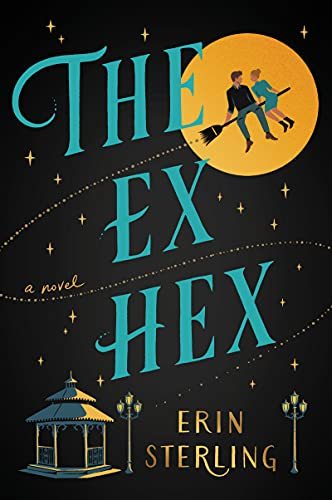
31. The Ex Hex by Erin Sterling Dates Read: Dec. 12-13 GoodReads Rating: Three stars Summary: A witch accidentally curses her ex-boyfriend, and by extension her small magical Georgia town. She and her ex have to lift the curse without falling in love (which of course they do anyway). One-sentence review: (directly from my GR review) Cute and witchy, just the thing to get you through finals week.
30. Romantic Comedy by Curtis Sittenfeld Dates Read: April 28-May 7 GoodReads Rating: Three stars Summary: A musician and comedy writer seem to hit it off when the musician guest stars on the comedy writer’s late-night show, only for the writer to blow it by assuming the musician is a shallow womanizer. A few years later, they rekindle their connection during pandemic lockdowns. One-sentence review: I liked the characters, but as usual Sittenfeld is more interested in commenting on whatever she saw on Twitter while she was writing this then she was on, like, writing a dramatic plot.
29. The Murder of Mr. Wickham by Claudia Gray Dates Read: Aug. 19-27 GoodReads Rating: Three stars Summary: All of Jane Austen’s beloved couples (except the Tilneys), plus the Darcys’ son and the Tilneys’ daughter, attend a house party at the Knightleys’ where Mr. Wickham turns up and is immediately murdered. One-sentence review: This is what P.D. James’ Death Comes to Pemberley SHOULD have been.
28. Lessons in Chemistry by Bonnie Garmus Dates Read: May 24-27 GoodReads Rating: Three stars Summary: It’s the 1960s, and chemist Elizabeth Zott was kicked out of her Ph.D. program for reporting her supervisor for rape, and then loses her job after she becomes pregnant outside wedlock, and ends up starting her own STEM cooking show and some other stuff happens, look, I know you already read the reviews of this one. One-sentence review: It was fine, I just thought it was overrated.
27. The Paris Deception by Bryn Turnbull Dates Read: Aug. 23-Sept. 7 GoodReads Rating: Three stars Summary: Two women immersed in the French art world in the 1930s and ‘40s defy their German occupiers by hiding, documenting, and sometimes copying “degenerate” art to keep it from the hands of high-ranking Nazi officials and sympathizers, or to keep it from being destroyed. One-sentence review: The main characters were great and I really like the focus on protecting art and culture from extermination, but the constant time jumps drove me nuts.
26. Forever, Interrupted by Taylor Jenkins Reid Dates Read: April 3-5 GoodReads Rating: Three stars Summary: Less than two weeks into her marriage, a young woman is widowed and only meets her mother-in-law at the hospital. The two strangers find a way to navigate their grief together. One-sentence review: While the grief could be gut-wrenching due to Reid’s fantastic writing, the characters were nothing spectacular.
25. Hell’s Half-Acre: The Untold Story of the Benders, America’s First Serial Killer Family by Susan Jonusas Dates Read: Jan. 29-31 GoodReads Rating: Three stars Summary: The Benders were a creepy family in late 19th Century Kansas who murdered people who stayed at their boarding house and then disappeared before they could be arrested. One-sentence review: I’m not super into true crime—it has to be historical for me to even start it--but I did like the look at life in the Midwest.
24. Galatea by Madeline Miller Dates Read: Jan. 6 GoodReads Rating: Three stars Summary: Madeline Miller retells the Pygmalion myth in a way that doesn’t suck. One-sentence review: Miller smartly skips the gender misery by making this a short story and then delivers an extremely satisfying ending.
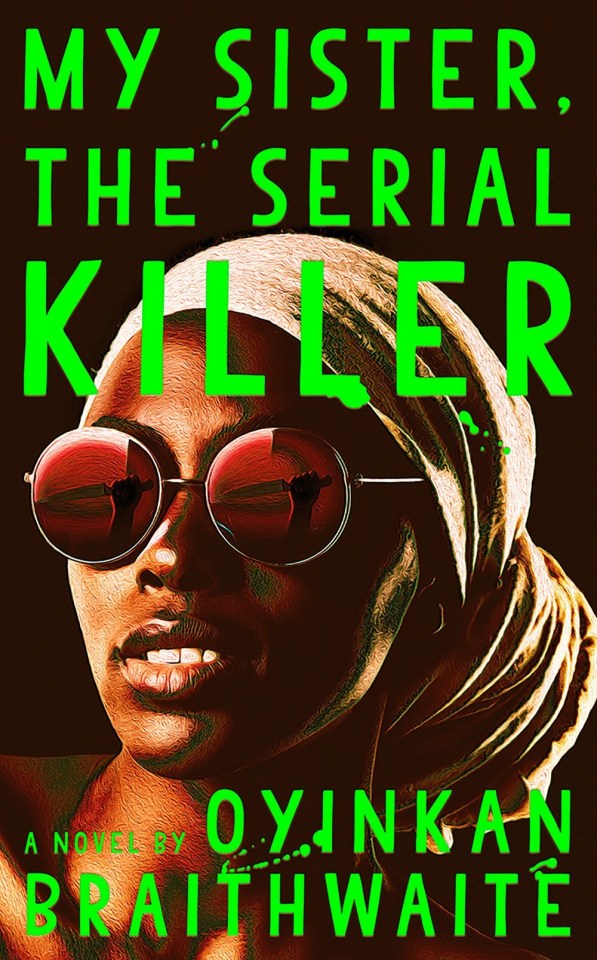
23. My Sister, the Serial Killer by Oyinkan Braithwaite Dates Read: July 26 GoodReads Rating: Three stars Summary: Korede and Ayoola are sisters who fall for the same man. Ayoola is hot and a serial killer, and Korede is getting pretty tired of covering for her. One-sentence review: Despite (or perhaps because) all the characters are awful, this book STAYS with you, and I feel like it would be a blast to talk about in a drunken book club. Note: I listened to the audiobook and want to give narrator Adepero Oduye a shout out.
22. The Weaver and the Witch Queen by Genevieve Gornichec Dates Read: July 24-Aug. 17 GoodReads Rating: Three stars Summary: Three friends in Medieval Scandinavia find themselves in the middle of a Game of Thrones-esque rivalry for the crown and a deadly battle between supernatural forces. One-sentence review: Good story and I liked the characters, but it moved too slowly sometimes.
21. The Wedding Dress Sewing Circle by Jennifer Ryan Dates Read: May 7-10 GoodReads Rating: Four stars (I was feeling more generous about Grace marrying Hugh than I am right now) Summary: A sewing circle in a small English village in the 1940s decide to pool their talents and resources to help English brides wear the perfect white gown to their weddings, clothing rations be damned. One-sentence review: Ryan excels at writing about women and civilians in wartime, and I would have ranked this so much higher if it hadn’t ended with the best character marrying the worst one.
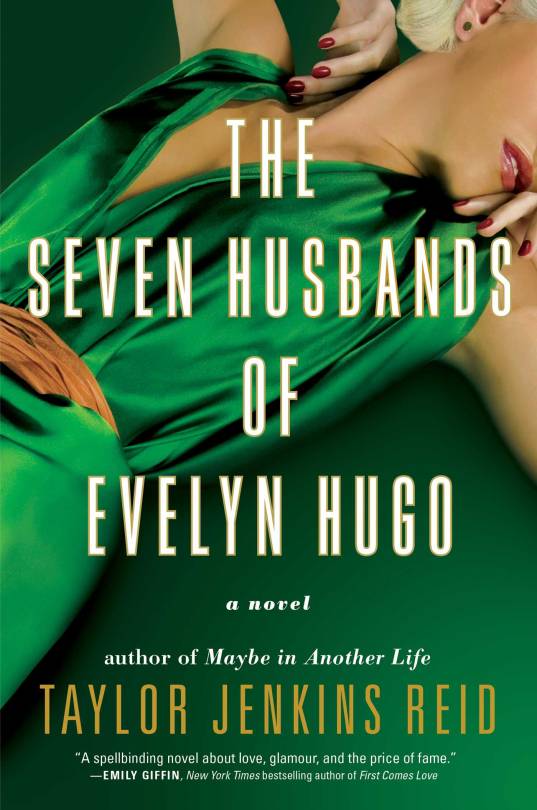
20. The Seven Husbands of Evelyn Hugo by Taylor Jenkins Reid Dates Read: Jan. 31-Feb. 8 GoodReads Rating: Four stars Summary: Aging actress Evelyn Hugo (who is not Elizabeth Taylor, by which I mean she absolutely is Elizabeth Taylor) invites a young journalist to write her life story. One-sentence review: The plot was engaging and thought-provoking, but I never could decide how I felt about Evelyn.
19. A House with Good Bones by T. Kingfisher Dates Read: Oct. 28-Nov. 1 GoodReads Rating: Three stars Summary: An archaeologist visits her mother at the family home in North Carolina only to find that her grandmother’s ghost is haunting it. But how do you banish a ghost once you learn it’s keeping something far worse at bay? One-sentence review: Of all the haunted house books I read this year, this one was the worst, and yet it was still great.
19. To Swoon and to Spar by Martha Waters (That’s right, I ranked a trashy Regency romance above both Romantic Comedy AND Lessons in Chemistry) Dates Read: May 17-24 GoodReads Rating: Four stars (Objectively, this was too many, but I also don’t care.) Summary: When Viscount Penvale’s uncle promises to sell him back the family estate for a steal if Penvale marries his uncle’s ward Jane, Penvale reluctantly agrees. He and Jane make an agreement to leave each other alone, but Penvale didn’t expect to fall in love with her. Nor did he expect his family house to be haunted. One-sentence review: The Regency Vows series just keeps getting better, honestly.
17. A Walk in the Woods by Bill Bryson Dates Read: Aug. 31-Oct. 13 GoodReads Rating: Four stars Summary: Humor writer Bill Bryson and his on-again-off-again friend Katz decide to hike the Appalachian Trail, and Bryson tells you all about its history and natural resources along the way. There are moose, but no (confirmed) bears. One-sentence review: This book got me really into nature and hiking again.
16. The Shining by Stephen King Dates Read: Dec. 1-4 GoodReads Rating: Four stars Summary: I know you know what this book’s about. One-sentence review: Super tense, riveting look into the mind of a toxic, self-absorbed abuser who doesn’t need to be anywhere near blizzards, haunted houses, or children.
15. Carrie Soto Is Back by Taylor Jenkins Reid Dates Read: July 12-23 GoodReads Rating: Five stars (Objectively, this book probably deserves that. Subjectively, I like Regency romances and journalists better than sports stars.) Summary: A retired tennis star full of rage and ambition makes a comeback to keep a younger player from breaking her record. One-sentence review: An absorbing, balanced take on the pressures women athletes face, plus a heart-warming father-daughter story, with some romance and female friendships to round it out.
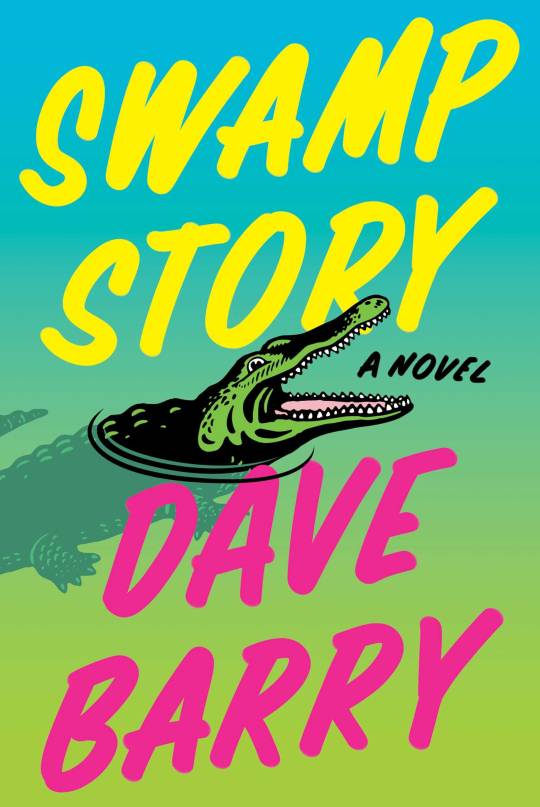
14. Swamp Story by Dave Barry Dates Read: Dec. 30 GoodReads Rating: Four stars Summary: There is actually too much going on to summarize this book, but suffice to say it involves a desperate single mom, her shirtless fame-hounding ex-boyfriend, a failed journalist with a drinking problem, and a lot of people in the Florida Everglades looking for a cryptid OR Confederate gold OR pythons. One-sentence review: Dave Barry writes about Florida like it’s a drunk, eccentric relative who everyone hangs around at the family reunion even though he smells bad, because he has the best stories.
13. Vampires of El Norte by Isabel Cañas Dates Read: Oct. 15-28 GoodReads Rating: Four stars Summary: During the Mexican-American War, a Wuthering Heights-esque couple learn their homeland is being stalked by vampires. One-sentence review: You root for the couple, you root for the Mexicans, you even root for the vampires once or twice, but you never root for the Texas Rangers. Note: The couple is Wuthering Heights-esque in the sense that he is poor, she is rich, they were childhood sweethearts, and then they were separated—not in the toxic incest way.
12. A Lady for a Duke by Alexis Hall Dates Read: July 12-23 GoodReads Rating: Four stars Summary: A trans woman believed to be dead at the Battle of Waterloo reinvents herself and returns home to England, only to find that her best friend has been consumed by grief over her death. As she helps him heal—and he slowly falls for her��she battles with whether to tell him who she really is. One-sentence review: I'm a sucker for love stories in which the couple are torn asunder, believe they will never see each other again, and then are reunited unexpectedly. Note: This actually would have ranked a lot higher if all the main couple’s angst wasn’t basically resolved in the first half. The second half is fine but not as good.
11. The Lover by Silvia Moreno-Garcia Dates Read: Dec. 26 GoodReads Rating: Four stars Summary: A young woman must choose between two potential “lovers” who come from the woods in this dark fairy tale novella. One-sentence review: Finally, a good werewolf book.
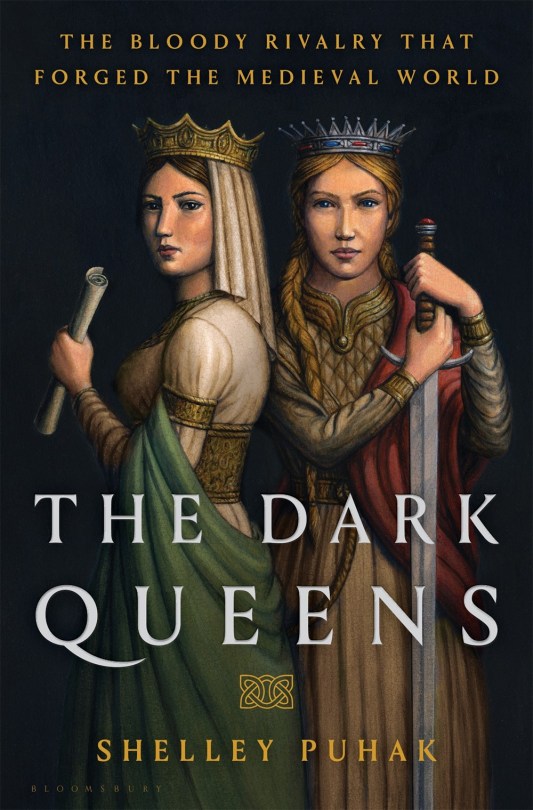
10. The Dark Queens: The Bloody Rivalry That Forged the Medieval World by Shelley Puhak Dates Read: April 4-14 GoodReads Rating: Four stars Summary: Puhak writes about the feud between rival Merovingian queens Fredegund and Brunhild in sixth century western Europe. One-sentence review: It’s like Game of Thrones, but real, shorter, and with more women and less sexual assault.
9. Lafayette in the Somewhat United States by Sarah Vowell Dates Read: Dec. 14-25 GoodReads Rating: Four stars Summary: Vowell writes Lafayette’s biography, focusing on his and the larger French role in the American Revolution, all while musing on our country’s inability to agree on anything. One-sentence review: Vowell’s irreverent essay style is just the tone needed to tackle the oft-romanticized American Revolution.
8. The Hacienda by Isabel Cañas Dates Read: July 23-26 GoodReads Rating: Four stars Summary: In the aftermath of the Mexican War for Independence, a young bride moves to her landed husband’s country estate, only to find that the house is super haunted and her new in-laws super racist. One-sentence review: Your standard haunted house story, except the ghost is colonialism.
7. Under the Whispering Door by T.J. Klune Dates Read: Oct. 29-31 GoodReads Rating: Five stars (was probably generous, but the ending had just made me cry, so) Summary: When workaholic Wallace dies, his spirit is sent to a teashop for transition to the afterlife. But after a few weeks of hanging around teashop owner and “ferryman” Hugo, his reaper, and the ghosts of Hugo’s dog and grandfather, Wallace realizes he doesn’t want to leave what he’s coming to think of as his family. One-sentence review: A lovely mixture of funny and sad, this book is a nuanced look at death and found family.
6. Mexican Gothic by Silvia Moreno-Garcia Dates Read: Nov. 1-6 GoodReads Rating: Four stars Summary: A debutante from Mexico City visits her cousin’s haunted house in the countryside where she’s pulled into a mystery surrounding her cousin’s eugenics-obsessed in-laws. One-sentence review: Noemi is a fantastic character, and the plot is engrossing, which is good because you will hate all the other characters.
5. Into Thin Air by Jon Krakauer Dates Read: Aug. 9-29 GoodReads Rating: Four stars Summary: In 1996, Outside magazine sent Jon Krakauer to cover the burgeoning commercialization of Mount Everest. When Krakauer climbed the mountain himself, he and his team got caught in a freak snowstorm that resulted in what was then the worst disaster in the history of the mountain. One-sentence review: Apart from being a really tense and riveting account of a brutal natural disaster in an already brutal environment, Krakauer’s account of the 1996 storm on Everest raises questions about who should be on the world’s highest mountain and whether money and fame have blinded guides and climbers to the risks of tackling the summit.
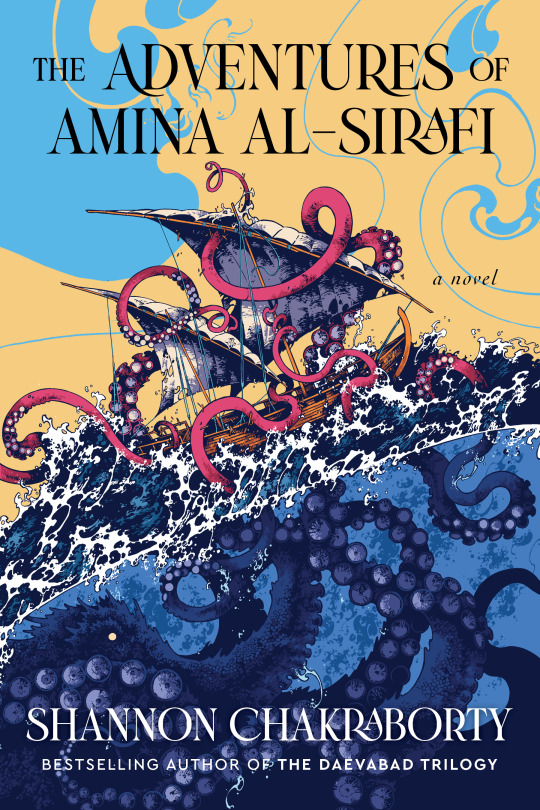
4. The Adventures of Amina al-Sirafi by Shannon Chakraborty Dates Read: Nov. 20-30 GoodReads Rating: Four stars Summary: Amina al-Sirafi, a retired smuggler and single mom on the Arabian peninsula, has to get her old band crew back together for the promise of more money than they’ve ever dreamed of when wealthy grandmother hires Amina to rescue her kidnapped granddaughter. But things go awry when the crew learns the girl is with an evil crusader with plans to unleash dark magic and monsters on the world. Inspired by the rich mythology, religions, and history of the Middle East, East Africa, and the Indian Ocean. One-sentence review: I have not had so much fun reading a fantasy novel since I was a kid reading Harry Potter and I can’t wait for the sequel.
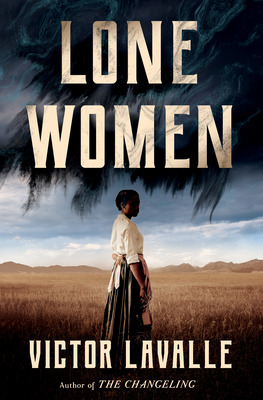
3. Lone Women by Victor LaValle Dates Read: Oct. 5-12 GoodReads Rating: Four stars Summary: In the early 1900s, a woman burns her parents’ mangled bodies in their California farmhouse and flees to Montana with a secret locked in a heavy trunk. One-sentence review: Frankenstein meets Calamity Jane in this horror Western about race and female friendships.
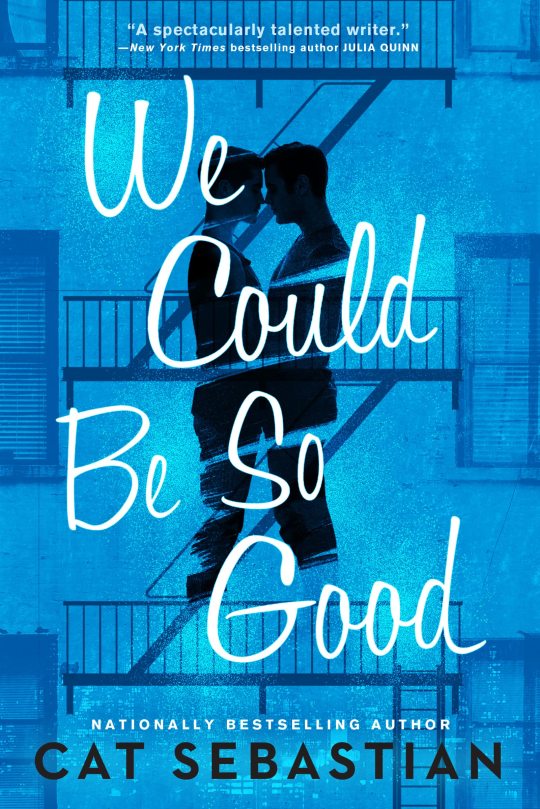
2. We Could Be So Good by Cat Sebastian Dates Read: Oct. 28-Nov. 9 GoodReads Rating: Five stars Summary: Two men reporting for a progressive newspaper in 1950s New York fall in love. One-sentence review: I mean, it’s journalists in love in the 1950s, and one of them is investigating police corruption and the other covered a Civil Rights meeting in DC, so of course I loved this book.
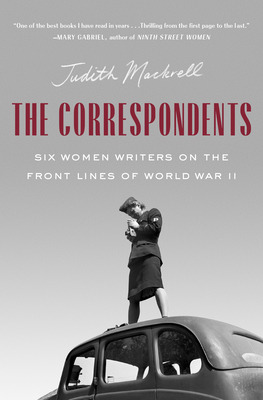
1. The Correspondents: Six Women Writers on the Front Lines of World War II by Judith Mackrell Dates Read: Nov. 27-Dec. 26 (during finals and holidays with family—I don’t think I could have finished the book if it wasn’t so good) GoodReads Rating: Five stars Summary: Mackrell covers the WWII careers of six journalists—a correspondent in Berlin who ingratiated herself in the Nazi Party to tell America about Hitler’s plans for world domination; a photojournalist for Vogue who took pictures from the Blitz to Dachau; a young American whose coverage of both sides of the Spanish Civil War catapulted her to journalistic stardom; Martha Gellhorn whose fury at her husband (you’ve heard of him) compelled her to illegally stow away on board a hospital ship and cover the invasion of Normandy from Omaha Beach while helping wounded soldiers; a rogue freelancer who broke the story of the invasion of Poland and whose thrill-chasing career took her from there to Greece to North Africa and beyond; and Helen Kirkpatrick, who covered the liberation of Paris while Hemingway was getting plastered at the Ritz.
Review: There is too much to say about this book. Mackrell did an incredible job. These journalists’ triumphs and tragedies play out alongside the triumphs and tragedies of the world’s biggest conflict. Each woman had different motivations and goals, from thrill-seeking to career-making, from spite to idealism to simply a love of journalism and dogged search for the truth. While Sigrid Schultz’s Chicago editor applauded Hitler’s control of Germany, Sigrid warned his readers of Hitler’s ambition. When the world turned a blind eye to Hitler’s military build-up and annexation of half of Europe, Virginia Cowles and Helen Kirkpatrick wrote furiously against Chamberlain’s policy of appeasement. And while the rest of the world celebrated the end of the war in Europe, Lee Miller swept through Dachau taking pictures and refusing to ignore the human cost of fascism and war.
All of this was at great personal risk. The Nazis tapped Sigrid’s phone and searched her house until she was finally forced to flee to America in the early 1940s (where her editor promptly benched her for three and a half years). Virginia dodged bombs in Madrid, and Helen dodged bullets in Paris. And Lee Miller defiantly washed off the stink of Dachau in Hitler’s own bath, which was immortalized in a photo her equally defiant boyfriend took in the days after the Fuhrer’s death. Mackrell’s prose also gets into the nitty gritty of correspondent life, how the reporters all camped out in hotels and spent their days chasing stories and their nights drinking whiskey. She discusses the friendships and rivalries—Marth and Virginia became great friends in Spain and eventually wrote a play together satirizing the misogyny they faced during the war. And while the stars are the six I mentioned above, cameos include Mary Welch (Hemingway’s wife after Martha), Dorothy Thompson, Vogue editor Audrey Withers, and “Maggie the indestructible” who convinced an American commander to let her go on a bombing mission over North Africa, paving the way for other women correspondents on the front line after the US entered the war. Plus there are appearances from Picasso, both Randolph and Winston Churchill, Eleanor Roosevelt, Dwight Eisenhower, David Lloyd George, the Duke of Windsor after he abdicated, Hemingway of course, and half the Nazi high command. Mackrell uses the women’s own words to describe the bombing of Madrid, the mass evacuation from Paris, the refugee crises in Eastern Europe, and the Night of Long Knives in Germany. Every moment is riveting as Mackrell and the women she writes about pull you into Europe of the 1940s.
#iz blogs about books#long post#the correspondents#the correspondents was so good you guys#also in my top 10#we could be so good#lone women#the adventures of amina al-sirafi#into thin air#mexican gothic#under the whispering door#the hacienda#lafayette in the somewhat united states#the dark queens#authors are#judith mackrell#cat sebastian#victor lavalle#shannon chakraborty#jon krakauer#silvia moreno garcia#tj klune#isabel canas#sarah vowell#shelley puhak#i loved how many of those authors' names autofilled as i tried to tag this#there are 21 other books on this list so i'm not going to tag all of them#anyway#happy new year
8 notes
·
View notes
Text
Reddit tier response
It’s simple, I go to the bookstore (or Amazon lately) and look under “adult fiction” and it’s almost entirely AI slop, smut, or AI smut. At least Wings of Fire doesn’t have an unnecessary sex scene in order to attract people who read for the “spice”.
No babe it’s so cool and hot that you always insist that fantasy books written to meet a 4th graders’ comprehension skills have more complex themes and a greater sense of praxis than anything written for adults
#granted there are adult authors I love#jon krakauer#john grisham#agatha christie#ally condie#brandon sanderson
17K notes
·
View notes
Link
This week, survival correspondent Blair Braverman tells Sarah the story of a Supertramp. In 1996, Jon Krakauer's book Into the Wild described a young man, Chris McCandless, who changed his name, walked into the Alaskan bush, and died after mistakenly eating a toxic plant. Or did he? Now, Sarah and Blair talk about the McCandless archive and its legacy in conversations around wilderness, Alaska, violence, and more.
#Chris McCandless#you're wrong about#Blair Braverman#into the wild#Jon Krakauer#podcast#podcasts#books and authors#books and writing#books and reading#alaska#nature#wilderness#20th century
1 note
·
View note
Text
#IFTTT#WordPress#Thought#authority#blood atonement#church history#D Michael Quinn#faith deconstruction#faith-promoting#fundamentalist#infalliability#Jon Krakauer#Lafferty#mormon faith crisis#mormon truth crisis#polygamy#Under the Banner of Heaven
0 notes
Note
can you do a blog about the main types of book genres there are if you haven't already? and how to know what you're writing?
Types of Book Genres
Mystery. Follows a crime (like a murder or a disappearance) from the moment it is committed to the moment it is solved. Mystery novels are often called “whodunnits” because they turn the reader into a detective trying to figure out the who, what, when, and how of a particular crime. Most mysteries feature a detective or private eye solving a case as the central character.
Thriller. According to the New York Public Library, thrillers gradually build anxiety and suspense. Examples of thrillers include “Gone Girl” by Gillian Flynn, “All Her Little Secrets” by Wanda M. Morris and “The Silent Patient” by Alex Michaelides. ⚜ Psychological Thriller
Horror. “Carrie” by Stephen King, “The Haunting of Hill House” by Shirley Jackson and Edgar Allen Poe’s work are all under the umbrella of horror. These works are intended to frighten audiences and elicit a feeling of dread, according to the CDE.
Historical Fiction. Historical fiction takes place in a historical setting, the CDE notes. Some examples of historical fiction include “The Prophets” by Robert Jones, Jr. and “The Four Winds” by Kristin Hannah.
Romance. Romance Writers of America (RWA) noted that romance refers to optimistic and emotionally satisfying stories that focus on a central love story. “The Love Hypothesis” by Ali Hazelwood and “Red, White and Royal Blue” by Casey McQuiston are both romance novels.
Western. Primarily set in the American Old West between the late 18th century and late 19th century and tell the stories of cowboys, settlers, and outlaws exploring the western frontier and taming the Wild West.
Bildungsroman. Translates to “novel of education” or “novel of formation,” chronicles a character’s journey from young innocence to worldly adulthood. This is a specific type of coming-of-age story in which the character gains knowledge and experience, even as innocence is lost.
Speculative Fiction. Refers to genres not based in reality, including work with magical, supernatural or otherwise imagined elements. Essentially, speculative fiction is the opposite of mimetic fiction. The category includes subgenres like fantasy, science-fiction, dystopian fiction and more, Witcover noted.
Science Fiction. This genre often involves science and technology of the future. Science fiction is frequently set in space or a different universe or world. It often uses some real theories of science.
Fantasy. According to the California Department of Education (CDE), fantasy "invites suspension of reality." The genre encompasses stories that wouldn't happen in real life, often set in another world or including magical elements.
Dystopian fiction. Imagines a future place in cataclysmic decline.
Action and Adventure. The tension of the protagonist’s journey in an adventure story creates a pulse-pounding, adrenaline-pumping storyline. Dramatic car chases, secret missions, and violent fight scenes often pop up in famous action stories. Great action writing draws in your audience, getting their adrenaline pumping as they turn the page.
Nonfiction (Memoir: Stories from an author’s life that offer a firsthand account of events are called memoirs. According to Reader's Digest, some highly-recommended memoirs include “I Know Why The Caged Bird Sings” by Maya Angelou and “Spare” by Prince Harry. ; Autobiography: a nonfiction (true) account of someone’s life. It is written by the subject of the autobiography; Biography: tell the story of a notable person’s life, written by someone other than the subject. Some examples are “Into the Wild” by Jon Krakauer, which tells the story of the adventurer Chris McCandless, and “The Immortal Life of Henrietta Lacks” by Rebecca Skloot.)
Food and Travel. Cookbooks, food history books, travel guides and travel memoirs all fall under this category that includes “The Omnivore's Dilemma” by Michael Pollan and “My Life in France” by Julia Child.
Humor. Strong humor writers have a way of spotting the patterns of life and bringing them to the surface at exactly the right moment.
Young Adult. YA books are intended for readers between 12 and 18 years old, according to Smithsonian Magazine. Some examples include “The Hunger Games” by Suzanne Collins and “The Hate U Give” by Angie Thomas.
Children's Fiction. Many classic examples of children’s literature are picture books, including “Where the Wild Things Are” by Maurice Sendak or “Don’t Let the Pigeon Drive the Bus” by Mo Willems. Scholastic noted most picture books are intended for children up to seven years old.
Knowing your Genre. The world of literature abounds with different genres.
Although every literary genre has its own trends and defining characteristics, the divisions between these categories aren't always clear. Whether you’re picking another book off the shelf or plotting out your new novel, learning more about genre can help you decide what comes next.
If you want to become a writer, there are a number of reasons to learn about genres, according to Paul Witcover, associate dean of the online Master of Fine Arts (MFA) in Creative Writing program at Southern New Hampshire University (SNHU).
“I feel it’s important for writers to have an understanding of genre because it will impact how their books are marketed, as well as how they are perceived by publishers,” he said. “But I also think writers can be too concerned with genre.”
Although he encourages writers to learn about the subject, Witcover noted a tendency for overly rigid ideas about the distinctions between genres. “Concepts of genre are more fluid than writers may believe,” he said. It's important to keep that fluidity in mind.
Genre is determined by need and audience expectation. Its set functions are determined by its social need.
Broadly speaking, the fiction world is divided into 2 segments: literary fiction and genre fiction.
Literary fiction typically describes the kinds of books that are assigned in high school and college English classes, that are character driven and describe some aspect of the human condition. Pulitzer Prize and National Book Award winners tend to come from the literary fiction genre.
Genre fiction has a more mainstream, populist appeal. It traditionally comprises genres such as romance, mystery, thriller, horror, fantasy, and children’s books.
Some genre writers straddle a line between genre-focused commercial fiction and the traditions of literary fiction.
Traditionally, there are 4 broader categories of genre:
Fiction: Imagined or invented literature is called fiction, Writers & Artists noted. Examples of fiction titles include “1984” by George Orwell and “Little Fires Everywhere” by Celeste Ng.
Nonfiction: According to Writers & Artists, nonfiction refers to fact-based works. Some nonfiction titles include “The Body Keeps Score” by Bessel van der Kolk and “I Am Malala” by Malala Yousafzai, and “Essentials of Classic Italian Cooking” by Marcella Hazan.
Poetry: Britannica defines poetry as “literature that evokes a concentrated imaginative awareness of experience or a specific emotional response through language chosen and arranged for its meaning, sound and rhythm.” Poetry incorporates poetic elements and encompasses the work of writers like Maya Angelou, Robert Frost, Amanda Gorman and Richard Siken.
Drama: Dramatic literature refers to texts of plays that can be read for their literary value as well as performed, according to Britannica. Dramas include stage directions and specific formatting not found in prose or verse. Some of the most studied dramas are Shakespeare’s plays, like “Hamlet” and “Romeo and Juliet.” You might be familiar with other dramas, too, like “Death of a Salesman” and “The Crucible” by Arthur Miller or August Wilson’s Century Cycle of 10 dramas depicting the Black experience in the U.S. throughout the 20th century, including “The Piano Lesson” and “Fences.”
Although most writing falls into at least one of these 4 categories, the edges are a bit blurred, and there can be overlap.
Sources: 1 2 3 4 5 6 ⚜ More: Writing Notes & References
It seems the general advice is to learn about the different genres first, and try to see which elements your story has that align with them. Perhaps start with the broader categories first, then narrow it down to the major genres, until you identify which specific subgenre your story fits. And it's fine if they overlap, as this happens with most novels. Hope this helps!
#writing reference#genre#writeblr#dark academia#writers on tumblr#spilled ink#fiction#novel#creative writing#literature#writing prompt#light academia#writing tips#writing advice#writing inspiration#writing ideas#writing resources
113 notes
·
View notes
Note
Read annihilation because of you, loved it!
Any more book recommendations?
aw glad you liked it :D
the rest of the series if you liked annihilation of course (tho its not quite as neatly well told they are good and i rly liked them as well. some rly rly good scenes especially the kind of whole run-up to the end of authority and a bunch of stuff in acceptance) . . others:
split tooth - tanya tagaq (heavy but very good, also nice illustration) into thin air & into the wild - jon krakauer (i liked both a lot) jonny appleseed - joshua whitehead (loved this sm) little blue encyclopedia (for vivian) - hazel jane plante (weird and lovely and caring. made me cry) underland - robert macfarlane (i feel like this goes with the weird fascination with abandoned and underground strange places thats in Annihilation but its nonfiction. instead of the tower its salt mines) comet in moominland - tove jansson (moominpappa at sea is one of my other favourites but this is the first novel. first book is technically moomins and the great flood but comet is rly good) the living mountain - nan shepherd (love anything appreciating mountains like this. i love the cairngorms too) our wives under the sea - julia armfield (this is pretty similar in vibes to annihilation, just the domestic came-home-wrong thing instead of travelling into the place that changes you, and the deep sea instead of swampland area x.. i have to assume the author read annihilation bc its v similar energy. i did like it a lot. leah is so me fr)
#asks#those are some books ive rly enjoyed#i havent finished underland yet. but still#into the wild was my train journey book and i was genuinely a bit sad i finished it because now what#i should read mor e. ... . but im tired but but but .
55 notes
·
View notes
Text
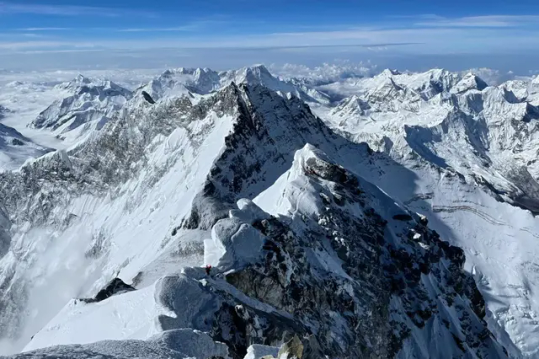
100 Years Ago They Disappeared on Everest. But Did They Make it to the Summit?
It’s one of climbing’s greatest mysteries: was Everest really conquered for the first time in 1953, or did two mountaineers make it to the summit in 1924, before dying in mysterious circumstances?
British climbers George Mallory and Andrew “Sandy” Irvine were last seen on June 8, 1924, 800 feet below the peak, before disappearing into clouds. They never reemerged.
When Mallory’s body was found in 1999, hopes were high that it might give a clue as to whether the pair reached the summit. But, tantalizingly, the camera he had been carrying – with which he would have documented the highest point they had reached – was not on the body. Irvine’s body has never been found.
But now, as the 100th anniversary of the mens’ disappearance approaches, one researcher believes that he has solved mountaineering’s greatest mystery.
By studying the expedition weather reports, author Graham Hoyland believes that he has worked out what happened to the pair – and whether they made it to the summit before they died.
Hoyland – a distant relative of another member of the expedition group, who has visited on Everest nine times searching for the remains – believes that the key to the mystery is air pressure.
His relative several times removed, Howard Somervell – another mountaineer, who had got within 1,000 feet of the summit on the same expedition before a lack of oxygen meant he had to retreat – was responsible for tracking the weather during the expedition.
The smoking gun?

The 1924 expedition, including Irvine and Mallory (top two left), aimed to be the first documented ascent of the mountain.
His records – which he submitted after the official report on the 1924 expedition was made, having returned to his job as a surgeon in India – show that the barometric pressure dropped between the morning of June 8 and June 9 at base camp, where Somervell was taking the readings.
Somervell recorded the pressure in inches of mercury, dropping from 16.25 to 15.98. Hoyland believes that these figures equate to a 10 millibar drop in pressure. Weather-related deaths on Everest are generally associated with a drop in barometric pressure at the summit.
A decrease of just 4 millibars can trigger hypoxia; a 6 millibar drop was enough to cause the incident in 1996 in which 20 people were trapped on the mountain, eight of whom died. That story is recounted in writer Jon Krakauer’s book “Into Thin Air.” The bad weather angle was also explored in a 2010 paper by experts from the University of Toronto, led by G.W. Kent Moore.
“They were climbing into an absolute s***storm – not only a blizzard but a sort of snow bomb,” Hoyland told CNN. Hoyland has experienced “snow bombs” himself on Everest. “It’s terrifying – the temperature drops hugely, you’re gasping for breath. There are winds of 100 knots. One guy I know was blown off the mountain, and ended up further up the mountain,” he said.
Effectively, the drop in air pressure meant that the mountain suddenly became higher – around 650 feet higher, to be precise. Hoyland calls it “an invisible death trap.”
The pair – who were ascending along the northwest ridge – were already climbing against the odds. Mallory wrote in a letter to his wife that he put his chances of making the summit at 50 to one. Hoyland thinks it was more like 20 to one. But, he thinks, they would have had no idea what was about to hit them.
“Mallory had seen Norton and Somervell get to to within 1000 feet of the top on 4 June using no oxygen equipment; it would have seemed reasonable to assume that it was possible to reach the summit with the apparatus,” he writes in a forthcoming book.
“What he didn’t know was that the rapidly falling air pressure was effectively making the mountain even higher.
What’s more, the storm and blizzard wouldn’t just have made a drop in air pressure. The pair were wearing layers of silk, cotton and wool. Hoyland – who had a similar made-to-measure outfit on an Everest trip – says that the clothes are exceptionally comfortable but wouldn’t have provided the warmth to survive a blizzard or an overnight.
Previously, it has been speculated that the pair had reached the summit before dying on the way down, something that Hoyland calls “wishful thinking.”
“I’d been trying to prove that Mallory had climbed Everest for years and years – I wanted to prove that I was the 16th Briton to climb it, not the 15th. But unfortunately when you read facts and they’re different, you have to change your mind. You can’t carry on being a wishful thinker,” he says.
Until Hoyland, nobody had closely studied at the weather reports, which were held at the Royal Geographical Society in London.
The summit was eventually reached by Edmund Hillary, a New Zealand mountaineer, in 1953 – the first documented ascent of the peak.
A century of speculation:
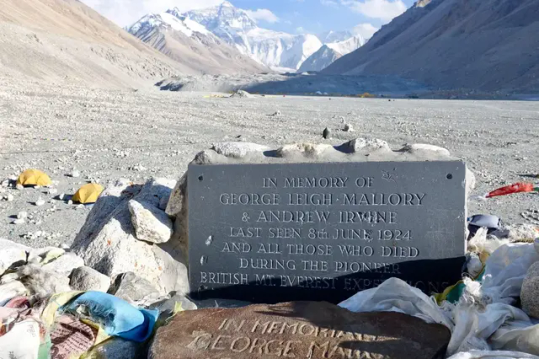

The mystery of Mallory and Irvine has intrigued adventurers for decades.
In 1933, another mountaineer, Percy Wyn-Harris found an ax near the summit. It was assumed to have belonged to Irvine.
In 1936, another mountaineer, Frank Smythe, believed he had seen two bodies in the distance. Using a telescope, he saw them at around 8,100 meters, or 26,575 feet.
And Chinese mountaineer Wang Hongbao believed he saw a body during his 1975 ascent.
Finally, an expedition in 1999, instigated by Hoyland, found Mallory’s body at 26,700 feet –2,335 below the summit.
Hoyland believes that the pair, tethered to each other, slipped while aborting the climb and returning to base camp. He thinks Mallory survived the initial fall, but took another, fatal plunge while staggering back to base camp. Irvine’s body has never been found.
Everest ‘Makes People Mad’:




While some of Mallory’s possessions were still to be found on his body, including a pair of goggles in his pocket – which suggests he was either in darkness or poor visibility – there was no sign of the photo of his wife which he had brought, planning to leave it on the summit.
For decades, researchers have posited that, in lieu of more precise evidence, the lack of photo suggests the pair might have reached the summit and fallen while returning.
However, having reviewed the new evidence, Hoyland believes this is not the case. Expedition reports noted a blizzard hitting the mountain at 2 p.m., he says – long before they could have reached the summit. The lack of photo, he thinks, means nothing. Mallory often forgot stuff, he notes.
In his last letter to his wife – digitized to mark the centenary of his ascent – on May 27, Mallory wrote of “looking out of a tent door onto a world of snow and vanishing hopes: and described it as “a bad time altogether.” Both he and Irvine were unwell, and he wrote that “I’m quite doubtful if I shall be fit enough.”
For Hoyland, who is taking part in an event at the Royal Geographical Society about the centenary, “Everest makes people mad.”
“Mallory became obsessed with the desire to conquer Everest – it would have made him somebody,” he said.
Mallory was a teacher, but moved on the fringes of the Bloomsbury set, a group of British intellectuals, artists and thinkers centered on London in the early 20th century.
“Everyone he knew was a famous novelist or a Nobel prizewinner, and he got captivated by it [the idea of Everest],” he said.
“There’s a dangerous thing called ‘summit fever’ – you see the summit, and you think, ‘Right, it’s death or glory.’ You don’t care if you die.
“I know that feeling. You get completely possessed by this mountain. Mallory was possessed by Everest and it killed him.”
Hoyland, who has since swapped mountaineering for extreme sailing, says that Everest has become “a non-mountaineer’s mountain.”
“There are rich men climbing it as a trophy. I wish it wasn’t the highest,” he said.
“Quite honestly I think the best thing to happen would be if the top 800 feet fell off.
By Julia Buckley.


#100 Years Ago They Disappeared on Everest#George Mallory#Andrew “Sandy” Irvine#Mount Everest#mountaineer#mountain climbing#1924 British Everest Expedition#history#history news#long post#long reads
56 notes
·
View notes
Note
i love your Sad Boat Book guides and was wondering if you have any recommendations for Non-Boat Related Sad Journey books?? just curious as i read one about the donner party this year and i don't know much about other doomed or difficult journeys! (though i know im at The Boat Blog so fair if you don't have any 😂)
HELLO and thank you for the ask! I absolutely do have Sad Journey recommendations for you, in a variety of flavors!
The Donner Party is a spiritual companion to Sad Boat media because 1) cannibalism and 2) the same cold snap that trapped the Donner Party was also responsible for Terror and Erebus getting frozen in, so they're basically twin tragedies. My favorite Donner Party books are The Indifferent Stars Above by Daniel James Brown, which focuses mostly on Sarah Graves, and The Hunger by Alma Katsu, a fiction book with a supernatural twist, but one that does a great job of capturing the true horror of what they endured!
Mountaineering is full of tragedy, and it has a lot of the same appeal factors as polar and nautical stories. The one everyone is most familiar with is Into Thin Air by Jon Krakauer, and with good reason! Krakauer is one of the most compelling authors of narrative nonfiction in the game, and you can safely pick up almost any of his books and encounter Men In Sad Situations. I am also partial to the story of the 1924 British Mount Everest expedition- the one where George Mallory and Sandy Irvine died. Into The Silence by Wade Davis and Last Climb by David Breashers and Audrey Salkeld both tell this incredible story.
In a similar vein, the story of the Uruguayan rugby players who crash landed in the Andes Mountains sounds like something you might enjoy! Alive: The Story of the Andes Survivors by Piers Paul Read is fascinating. Some of the survivors also wrote memoirs which I personally find more compelling, but I don't want to give away the names of the survivors- once you know, you can look them up, or message me and I'll send them to you. Once you know the story, check out Society of the Snow on Netflix- it's great!
Interested in Sad Journeys in warmer places? DEFINITELY check out The Lost City of Z by David Grann, another can't go wrong author of narrative nonfiction! This one follows the explorer Percy Fawcett as he travels into the jungles of the Amazon searching for the lost city of El Dorado. It... does not go well. There's also a cameo appearance from James Murray of Karluk fame (if you haven't read The Ice Master or Empire of Ice and Stone, please do, I am begging you!)
I also want to put in a plug for military nonfiction, which often scratches a similar itch for me. I'm currently reading Skies of Thunder by Caroline Alexander, about a completely insane WWII mission to fly needed supplies over the Himalayas. Also check out With The Old Breed: At Peleliu and Okinawa by Eugene Sledge. Talk about a devastating journey.
A few more recommendations that aren't necessarily Sad Journeys, but they are definitely Sad and have similar vibes:
Midnight in Chernobyl by Adam Higginbotham
Triangle: The Fire That Changed America by David von Drehle
The Johnstown Flood by David McCullough
There are many many more fantastic books that I couldn't include, but I hope this is enough to get you started! Thanks for a fun ask, and happy reading! <3
35 notes
·
View notes
Text
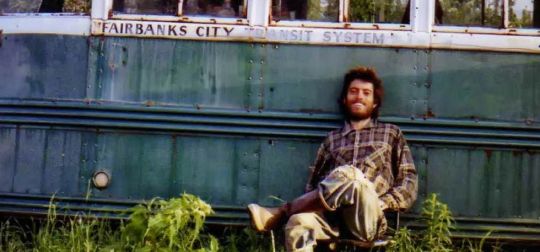
Christopher McCandless, The Man who Hiked to Death
Born February 12th 1968, in Inglewood, California, Christopher McCandless was immediately plunged into a chaotic family. His sister, Carine McCandless, documented in her book ‘The Wild Truth’ that they shared their home with six half-siblings. Carine also alleged that her parents were abusive, both physically and verbally, toward the McCandless children. She documented how her father was an alcoholic, and their mother often fed off his evil energy, inflicting her own abuse upon them.
The McCandless never stayed in one place for long as Walt McCandless worked for NASA as a rocket scientist, taking him across the U.S. Eventually, the family settled in Virginia long enough for Christopher and Carine to graduate.
Following his graduation from university, Christopher knew he needed to travel. He had spent much of his childhood moving from town to town, state to state, and this had a profound impact on his outlook on life.
He only stayed in one place for a short time, seeing the beauty in exploring the world. In mid-1990, Christopher left Virginia for new pastures and began driving West. He stopped in towns and cities along the way, picking up odd jobs to make ends meet. By April of 1992, Christopher was itching for another adventure, and that is when he decided to make his way to Alaska, the final frontier of the U.S.
Incredibly, Christopher managed to hitchhike from Carthage, South Dakota, to Fairbanks, Alaska, a whopping 3,000+ miles through Saskatchewan, Alberta, British Columbia and Yukon, Canada. Eventually, he arrived, and he began planning his largest expedition yet. He wanted to hike through the Denali National Park. The park covers over 6,000,000 acres in the middle of Alaska. Communities are few and far between, with many Alaskans congregating near large towns and cities.
Despite the harsh weather conditions of Alaska, Christopher McCandless seemed ill-prepared. Fellow hikers and locals recalled seeing Christopher arrive in Fairbanks carrying only a backpack. He also stood out for his ‘Hippie-like’ appearance, choosing to remain unkempt and dirty. April 28th 1992, would mark the last day that Christopher McCandless would ever see the seeds of civilisation.
That day, Jim Gallien was flagged down by Christopher, who was looking for a ride to the Stampede Trail in the Denali National Park. Gallien later told author Jon Krakauer that he had doubts about the 24-year-old’s survival from the start. When he got into his car, Christopher had minimal clothing and a backpack. Christopher explained that he was carrying a 10 lb bag of rice, a Remmington semi-automatic rifle and a pair of Wellington boots inside his bag. Gallien was, in fact, so concerned that he offered to drive Christopher to Anchorage so that he could purchase the necessary equipment for him. He knew how harsh and unforgiving the Alaskan landscape could be, and per population, it has an alarmingly high missing persons rate. Throughout their drive, Christopher assured Gallien that he would be fine and had hiked many times before.
It wasn’t until months later that Gallien learned Christopher’s real name, as when he had picked him up, he had simply given the name ‘Alexander Supertramp’. The only item that Christopher accepted from Gallien was a map. Before leaving, Christopher asked Gallien to snap a picture of him at the Stampede Trail, making this one of the last photographs ever taken of Christopher McCandless.
For two days, Christopher hiked the Alaskan wilderness, soaking in the beauty of the Denali National Park. After a gruelling march, Christopher made it to an abandoned blue and white bus. Whilst the exterior was rusted and hadn’t been loved for some time, Christopher recognised it was the perfect shelter and base camp. He wasted no time setting up his gear and prepping his new home.
The blue and white bus that would become a notorious tourist hotspot was not Christopher’s intended finish line. According to his diary, which was later discovered with his body, Christopher had planned to hike through the park and to the Bering Sea. Christopher remained at the blue and white bus for two months, eagerly journaling every step. Christopher wrote in his diary that he had begun consuming the roots of the Hedysarum Alpinum plant. Christopher also detailed in his diary how he had trapped and hunted small game and wildlife. He had successfully hunted a moose/caribou with his rifle. However, the meat was rotten by the time he came to consume it. With just 10 lbs of rice and foraged plants, Christopher rapidly began losing weight.
The lack of food and people was beginning to get to Christopher, who heavily documented his trip via his journal and camera. On July 3rd 1992, Christopher packed up his things, leaving the blue and white bus behind.
With a map in hand, Christopher hoped to reach civilisation once more, but the landscape had changed and he became distressed and returned to the blue and white bus to wait out the days until the river froze over once more.
On July 14th, he also began to incorporate the seeds of the Hedysarum Alpinum plant into his diet, as was documented in his diary. The meagre diet of plant material and small animals was nowhere near enough to sustain Christopher, who continued to waste away. As he continued to weaken, he lost his energy and ability to forage further afield for plants and fruits.
Christopher McCandless made his final diary entry on what he noted as ‘Day 107’. The entry simply reads, “Beautiful blue berries.” Author Krakauer noted that days 108 through 112 had / (slashes) but no words, and after Day 113, no more entries were made. Sometime around these final diary entries, Christopher wrote, “I have had a happy life and thank the Lord. Goodbye, and may God bless all.” It is clear Christopher knew his end was coming, and he had made his final preparations and peace with his fate.
It wasn’t until September 6th 1992 that the grizzly truth would be revealed.
That day, hikers in the Denali National Park came across the blue and white rusted van that Christopher had once called home.
These hikers had the same idea as Christopher and were eager to use the bus as shelter.
When they approached the bus, they found a note taped to the door which read “Attention possible visitors. S.O.S. I need your help; I am injured, near death and too weak to hike out. I am all alone; this is no joke. In the name of God, please remain to save me. I am out collecting berries close by and shall return this evening. Thank you, Chris McCandless, August.”
As they moved through the bus, they saw the familiar outline of a human in a sleeping bag. After reading the note, they hoped that Chris had managed to survive, but all hopes were dashed when the stench of decay overcame them. The hikers took a closer look, and their worst suspicions were confirmed. Christopher McCandless was deceased, his body decaying in a sleeping bag in the back of a rusted-out bus.
Alaska State Troopers and Denali Park staff were summoned to the bus where Christopher’s body was recovered. His family were notified of the terrible news, and preparations for his body to be returned to Virginia were made.
Christopher’s passing marked a turning point in the culture surrounding hiking and travelling. He had wilted away in the wilderness when a bridge and cabin were within a few miles of his location.
37 notes
·
View notes
Text
pick a book for me to take on work travel

Ends of the World by Peter Brannen - nonfiction geology book about earth's previous mass extinction events. The author is also the writer of one of my favorite climate history Atlantic articles I read for a college assignments.
Into the Wild by Jon Krakauer - nonfiction true story of Chris Mccandless, who decided to leave society to live in the Alaskan wilderness and was later found dead. I want to read Into Thin Air too but I don't have a copy (my mom probably does but that won't help me for this trip)
Dune by Frank Herbert - do i have to describe what Dune is about at this point? I've never read it and I also refused to see the movies 'caues I wanted to read the book before doing so
A Song for the River by Philip Connors - nonfiction/memoir by the same author who wrote my beloved fire lookout book Fire Season. This book also has to do that, as well as a massive fire he witnessed in his national forest, but I think it's a lot more about grief and death.
What the Eyes Don't See by Mona Hanna-Attisha - nonfiction/memoir by one of the doctors who discovered the Flint water crisis. I'm actually already 90 pages into it but got distracted and haven't picked it up for like a year. It's very good and highly relevant to my work (though I don't do lead in tap water but you know it's great information to have)
#i can't believe there's only one fiction book on this list omg#i do read a lot of fiction ofc but i think i more often check them out via libby or read on my phone#i will bring whatever book you vote but if my heart is pulling me to a different one i'll bring both#quara talks books#i love how my books here so obviously demonstrate my inclination towards environment related things#i also own a Fat anthology of american environmental writing excerpts and essays sincd thoreau#also keep meaning to reason silent spring by rachel carson. kind of a crime i havent tbh#but i may have to do it as an audiobook instead#and ofc my losing earth by nathaniel rich that i havent read yet because i know it will invoke strong Despair
18 notes
·
View notes
Note
Favorite books??
(I mean everyone in your little family + you) 😇😇
Helloooo! Thank you for this ask! We have decided to list favorite books by ages for everyone below the cut! So, all of our favorite books as children, our favorite books as tweens, and our favorite books teens and adults!
And yes, each family member is responding to this ask!
Please note there is mention of Harry Potter, I (JIG) know the author/books are triggering to some, so please do not take offense to this, I just feel like the books would have been some read by one family member in particular wayyyyy before all the unsavory details came out.
Also, a lot of these books are my personal favorites, or they are books I actually dislike immensely…so my selfship kids liking them makes me laugh 😂.
Zach: As a child I was always partial to The Velveteen Rabbit by Margery Williams and the Peter Rabbit books by Beatrix Potter. I also loved How The Grinch Stole Christmas by Dr. Seuss. As a tween/teenager, I liked the Harry Potter series by JK Rowling, the Lord of the Rings series by J.R.R. Tolkien, and the Ender’s Game Saga by Orson Scott Card. Now that I’m an adult, I’d have to say The Great Gatsby by F. Scott Fitzgerald and 1984 by George Orwell are probably my favorite novels.

Violet/JIG: As a little girl my favorite book was The Foot Book by Dr. Seuss, there was just something about the “here comes pig feet” line that cracked me up, I also adored Thunder Cake by Patricia Polacco. As a tween I loved Grandpa’s Mountain by Carolyn Reeder and the American Girls Books. As a teen and adult I’d say my favorite books were/are Where the Red Fern Grows by Wilson Rawls, The Education of Little Tree by Forrest Carter (the best nonfiction book I’ve ever read), Speak by Laurie Halse Anderson, The Fear Street Series by RL Stine, and anything by Mary Downing Hahn.

Varina: As a child my favorite books were Winnie-the-Pooh stories, my mom had an entire collection her parents collected for her and she read them to me and all my siblings! I also loved A Bad Case of Stripes by David Shannon, the Mr. Putter and Tabby books by Cynthia Rylant, and the Amelia Bedelia books by Peggy Parish. As a tween I enjoyed The Tale of Despereaux and the American Girls books. As an adult/teen my favorite books were/are Of Mice and Men by John Steinbeck, The Magic of Ordinary Days by Ann Howard Creel, and I adore any romance novel by Nicholas Sparks.

Vera: When I was a little girl I loved the Fancy Nancy books by Jane O'Connor, any and all princess books, the Biscuit books by Alyssa Satin Capucilli, and the Junie B. Jones Books by Barbara Park. As a tween I read the American Girl books, but only I enjoyed a few of the series, Samantha was my absolute favorite! I also loved The Secret Garden and A Little Princess by Frances Hodgson Burnett, and The Wish by Gail Carsen Levine. My favorite books during my teenage years, and as an adult, are The Glass Castle by Jeanette Walls, any of William Shakespeare’s plays (Romeo and Juliet is my favorite), and Wuthering Heights by Emily Bronte.

Victor: When I was little my favorite book was Green Eggs and Ham by Dr. Seuss, my favorite book series was Curious George by Margret and H. A. Rey. During my tween years I read any Goosebumps book by RL Stein I could get my hands on, I also read all The Chronicles of Narnia books by C.S. Lewis, and A Series of Unfortunate Events books by Lemony Snicket. My favorite book as a teenager was The Outsiders by S. E. Hinton, and my favorite book series as a teenager were Miss Peregrine's Home for Peculiar Children by Ransom Riggs and the Lord of the Rings by J.R.R. Tolkien. My all time favorite book as an adult is Into The Wild by Jon Krakauer.

Vallen: The Wonky Donkey by Craig Smith was my favorite book as a kid, it was freaking hilarious, and the sequel was almost as good. I also loved the Clifford books by Norman Bridwell as a kid, and the No David books by David Shannon. As a tween I read a bunch of the Goosebumps books by RL Stine. Victor and I were in competition to see who could read the most, he won of course, the dedicated bookworm. In my teenage years and into adulthood my favorites have become The Lord of the Flies by William Golding, The Giver Quartet by Lois Lowry, and The Wayward Pines Trilogy by Blake Crouch.

Victoria: When I was a little girl I loved all of the Eric Carle books, The Very Hungry Caterpillar being my favorite! I also loved all the Little Golden Books, I think my favorite one was My Little Golden Book About God by Jane Werner Watson. Charlotte’s Web by E.B. White, Each Little Bird that Sings by Deborah Wiles, and the Little House on the Prairie Series by Laura Ingalls Wilder were my favorite books during my tween years. As a teenager I enjoyed reading the Miss Peregrine's Home for Peculiar Children book series by Ransom Riggs and To Kill a Mockingbird by Harper Lee. As an adult I’d say my favorite books are Wish You Well by David Baldacci or Go Down the Mountain by Meredith Battle.

#wild kratts#zach varmitech#wild kratts zach#love zach varmitech#ziolet#wild violet au#violet varmitech#wild kratts oc#wild kratts au#varina varmitech#vera varmitech#victor varmitech#vallen varmitech#victoria varmitech#self ship#selfship#f/o x s/i#asks#ask box#ziolet asks#selfship fankid#books#favorite books#jig posting
15 notes
·
View notes
Text
internet beef so bad they got me defending published author jon krakauer in the youtube comment section
#am i doing it so jon hearts my comments like he's been doing with all the other ones on the video? well maybe.#maia.txt
5 notes
·
View notes
Text
I read 52 books this year. I also met my vague goal of "more nonfiction". I read a truly absurd amount of fanfiction (I sadly did not keep track- yes, most of it was transformers). Here are the top 10 reads of 2024:
1. Meet me by the Fountain: An Inside History of the Mall by Alexandra Lange. While this wasn't the best written book, I keep thinking about it months later. The Mall™️ was and is such a unique city space. Reading about malls got me thinking of the city in ways I've never had before. It also exposed so much pettiness in the architecture design world. I'm planning to read more about cities and urbanism this year.
2. Into Thin Air: A Personal Account of the Mount Everest Disaster by Jon Krakauer. Was recommended to me as simply "a damn good book", and that review holds true. It's a damn good book.
3. I'm Glad My Mom Died by Jannette McCurdy. I missed the iCarly train, but I'll be very interested to see what Jannette McCurdy does in the future. I listened to the audiobook of this.
4. Remote Control by Nnedi Okorafor. Nice novella, and I think I liked it so much due to when in my book year I read it (in between some more boring nonfiction and 2 dropped fantasy books).
5. Fourth Wing by Rebecca Yarros. This book objectively sucks. But I had so much fun reading it. The thing that makes this book fun is the potential it has to be good (it's not good). Don't read the second book.
6. Unmask Alice by Rick Emerson. Beatrice Sparks is the author behind Go Ask Alice, and this takes a look at who she was as a person (read: a pos). The only gripe I have about this book is the lack of citations (which the author makes a note about in the beginning) but taking this book with a grain of salt (about taking an author's books with a grain of salt), it's a good read.
7. They Promised Me the Gun Wasn't Loaded by James Alan Gardner. I accidentally read the second book first, but I'll be going back for more. (She's from Alberta, and her superhero name and costume is a homage to Wayne Gretzky. You already have me hooked James) This guy doesn't care about the science to superheros. He cares about having fun. I like this version of fun vs Jon Scalzi. Very glad to find another person saying Ontario sucks
8. The Female Man, by Joanna Russ. 70s feminism, with alternate dimensions and five (of maybe the same) women. How are we feminist based on our societies? What does feminism look like? I'm going to have to reread this book in two years and see what I get out of it then.
9. Goldenrod by Maggie Smith. Some of these poems hit me like a sack of bricks. Some of them I cannot relate to, but we're still absolute bangers.
10. Sleeping Giants by Sylvain Neuvel. The thing that saves this book's plot is that it's written interview transcript style. I read the second one, but probably won't read the third. Fun presentation at least!
2025 reading goals:
More comics. I'm probably going to reread MTMTE. And Saga.
Get a dent in the backlog of ebooks Tor used to send out. I have. 25 to read.
Read more about urbanism and cities. I really liked learning about "why this worked in city x and not y" while I read about The Mall™️. I've got one on urban wildlife in my holds already.
If you want the full list of books, it's up on my Goodreads.
#book review#book recommendations#text post#honestly kind of a shit year for books#most of my favorites were nonfiction#the “fun books” i had planned were not as fun as i had hoped
3 notes
·
View notes
Text
TRCC Readathon Day 6:
No i na co ci te góry? - conquering Denali today; I started yelling at the author whenever her on-again-off-again boyfriend is mentioned, which means I care about her enough. Also the depiction of the climb made me think Jon Krakauer is full of shit even more so than the controversy about his version of the 1996 Mount Everest summit tragedy did.
The Book of Cold Cases - 22% in; I made a mistake reading some of the reviews, most of which agree on: the beginning is the strongest part. Meanwhile, I'm having a hard time getting into it at all, so if that's the best I can get, maybe I should just drop it?
The Art of War - halfway through, with some notes. Now I'm pretty sure the sellsword company I've created in high school does actually make sense.
2 notes
·
View notes
Note
Hi I was wondering what you top mountain books of 2024 were? What are your recommendations?
hello mysterious anonymous asker thank you for asking ♡. im replying so late cause i need my laptop to add images for some reason. ive decided to give up on the images lol. anyone is free to dm me if you want pdfs or epubs or whatever i would love to be your mountaineering book dealer.
my top three of 2024 in terms of enjoyment would probably be (no particular order):
into thin air by jon krakauer, it's a classic for a reason. more on it further down in the post
k2: life and death on the world's most dangerous mountain by ed viesturs, i like the historical approach with the memoir part weaved through it, and ed's bitchy nature is a source of great enjoyment to me
i miei ricordi: scalate al limite del possibile by walter bonatti, idgaf if it's recency bias bonatti was such a great writer on top of being a truly terrific climber and just a great fucking guy.
as for recommendations im gonna approach this q as recs to get into mountaineering literature. this is in no way a comprehensive list btw im writing this while after lunch coffee is happening at a family gathering so youll understand if i limit myself to three.
first off i'm gonna say into thin air by jon krakauer again. aside from having the advantage of being widely translated, it's not a book that assumes or requires much technical knowledge and it's well written, truly gripping and really touching. its great. shoutout to jon k.
then, i would be remiss not to cite touching the void by joe simpson. im notorious among my friends for getting random people to read it. i got my mother who does not like mountains to read it and even she loved it. she now has a parasocial relationship with joe simpson. its so interesting from the psychological perspective of being into this guy's head in a seemingly absolutely hopeless situation.
lastly im gonna recommend also touching my father's soul: a sherpa's journey to the top of everest by jamling t. norgay. id recommend to read it after into thin air, and it's just such a lovely read. it also delves into sherpa traditions and the sherpas' history in himalayan mountaineering, as well as the author's relationship with tradition, buddhism etc and his relationship with his larger than life father (tenzing norgay, the first man to summit everest together with edmund hillary)
thank you for asking ♡♡♡ love you xx
3 notes
·
View notes